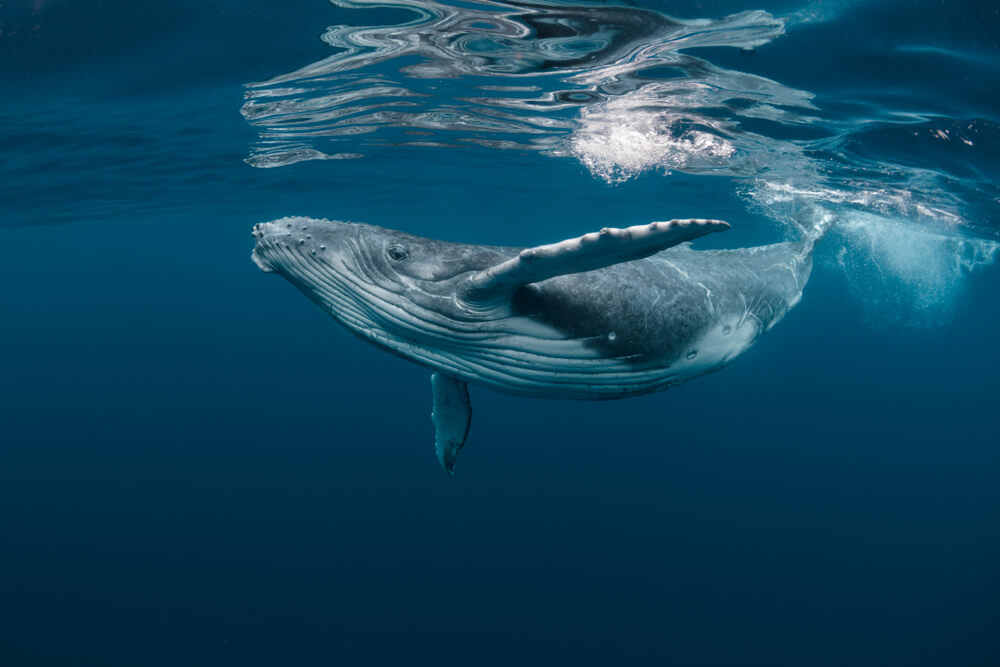International Whaling Commission (IWC)
The International Whaling Commission (IWC) was established in 1946 by the Convention for the Regulation of Whaling (ICRW). Its mandate, drafted within the context of that time, was the worldwide conservation of all whale stocks and the sustainable management of whaling. OceanCare has held observer status at the IWC since 1992. We are dedicated to upholding the global moratorium on commercial whaling, which has been in force since 1986 and to encouraging the transformation of the IWC into a modern conservation body that addresses the full range of threats to all whale and dolphin species. Since 2015, OceanCare has also been represented through experts in the IWC’s Scientific Committee where we actively contribute.
The IWC has 88 member states (as of 2022), all of which have ratified the International Convention for the Regulation of Whaling. In 1982, the member states decided to ban commercial whaling activities worldwide. This global ban on commercial whaling, also known as the moratorium, came into force in 1986 and is still considered to be one of the greatest achievements in international animal and species conservation. It has saved the lives of hundreds of thousands of whales to date. However, there are two other categories of whaling. One is the allocation of catch quotas for Aboriginal Subsistence Whaling (ASW) for those peoples who have an ongoing whaling history and genuine nutritional need and which are recognised as such by the IWC. The second is regulated by Article VIII of the ICRW, «Special Permit Whaling» which also provides, as a treaty right, states to issue permits for research purposes. This is sometimes called «scientific whaling».
For many years, the IWC, through its expert subsidiary groups, has intensified its work on the numerous threats affecting whales and small cetaceans (including dolphins and porpoises). This includes efforts to better understand and address the impacts of by-catch, ship strikes, underwater noise pollution and marine debris, as well as habitat destruction and the consequences of climate change.
In 2016, the IWC recognised the important role of whales in marine ecosystems. Since then, the IWC has been debating the treatment of whales, not only against the background of animal and species protection, but also from a broader ecological perspective. The orientation of the IWC’s work is mostly governed by the adoption of resolutions at the «Commission meetings» where all the member nation meet. These resolutions are passed on the basis of a simple majority, while a decision on certain other issues, including quotas and whale sanctuaries, have to be adopted with a three-quarters majority.
OceanCare’s goals in the IWC
OceanCare is campaigning for a fundamental reform of the IWC. Structural deficits, budget constraints and unresolved questions regarding jurisdiction are increasingly preventing the implementation of many of the measures adopted for the protection of whales. Together with partner organisations, OceanCare has developed a roadmap document, A 50 year vision for the IWC, which focuses on strengthening the protection of whales and shows how corresponding measures can be financed.
One focus is to maintain the whaling moratorium and extend it to all cetacean species, so that also small cetaceans may no longer be hunted for commercial purposes worldwide. In addition, Aboriginal Subsistence Whaling must be clearly differentiated from commercial whaling.
OceanCare has held observer status at the IWC since 1992 and is very familiar with the stakeholders and rules of the body. Accordingly, we seek to improve both the setting of priorities and the working processes of the various bodies of the IWC in order to advance effective science-based conservation action. This includes integrated coordination of the work of the IWC Science Committee and the priorities of the Conservation Committee, which both develop recommendations for member states.
Issues of importance to us in the IWC Scientific and Conservation Committees include:
- The threat to whales and dolphins and their prey from the effects of underwater noise pollution;
- The danger to whales from ship collisions;
- Consequences of fishing, as well as plastic pollution of the ocean;
- The development of action plans for the conservation of particularly threatened species and populations;
- The impact of climate change on whales and dolphins;
- Improved management of whale and dolphin watching.
Through its studies on the health risks of consuming whale meat contaminated with harmful substances, OceanCare has stimulated cooperation between the IWC and the World Health Organization (WHO). We have also campaigned for the clear regulation of the rights and obligations of non-governmental organisations so that they can participate and be heard as representatives of civil society.
OceanCare also provides financial support to the IWC Voluntary Fund for Small Cetaceans Research & Conservation, the by-catch mitigation initiative as well as for the IWC expert group on stranding and emergency response.
